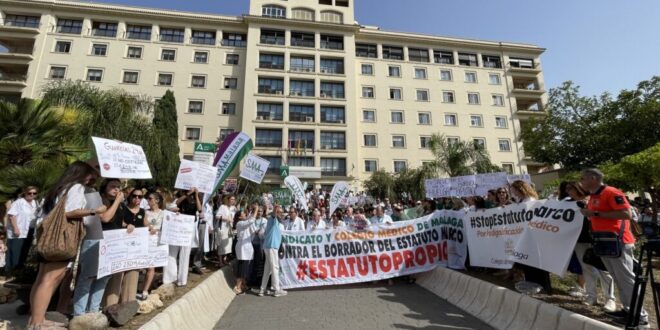At the University Hospital, 500 doctors gathered.
Credit: Colegio Oficial de Médicos de Málaga
According to the Malaga Medical Union 95 per cent of Malaga’s doctors participated in the protest on Friday June 13 against the Ministry of Health Framework Statute.
The strike was organised by the Spanish Confederation of Medical Unions and the Andalusian Medical Union. It reflects the widespread opposition against a proposed regulation governing the working conditions of public health professionals.
The Malaga College of Physicians described the strike as a great success. It highlighted the unification of the medical community against a draft which, they claimed, ignores the doctors’ needs and their training, and compares them to other healthcare workers. Dr Pedro J. Navarro is the president of the Malaga College of Physicians. He emphasized the high participation of the strike and urged the Ministry of Health reconsider its statute. “This draft undercuts doctors and ignores their role. Navarro stated that “this proposal harms physicians as well as the quality of health care”.
Navarro, along with a majority of the College Board of Directors, attended a protest at the Regional University Hospital of Malaga, where more than 500 doctors gathered. The Malaga Medical Union stated that 95% of the doctors in the province who were called to strike participated. This shows a strong opposition to proposed legislation.
The strike committee listed several demands. They included a separate statute for physicians and new regulations to end the long on-call hours. Also, a professional classification system which recognizes the years of education, specialisation and responsibilities of doctors. The strike committee also demanded a national compatibility model that would ensure no pay cuts to doctors in the public or private sector, flexible retirement options for those between 60 and 70 years old, and early retirement, with appropriate adjustments. They demanded, most importantly, that the on-call time be included in pension calculations.
The committee rejected the forced mobility measures, and criticized the professional performance evaluation model proposed. They argued that it was demotivating rather than motivating doctors.
The Malaga College of Physicians (MCP) and the medical unions have vowed to continue their advocacy for a law that recognizes the unique role of physicians in providing high-quality health care for all patients throughout Spain. For the moment, there are no planned days of strike action.
 Costa News Spain Breaking News | English News in Spain.
Costa News Spain Breaking News | English News in Spain.




